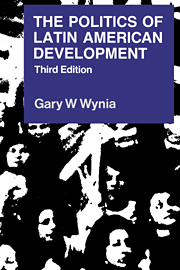Book contents
- Frontmatter
- Contents
- List of maps and tables
- Preface to the third edition
- Preface to the second edition
- Preface to the first edition
- Map 1 Latin America
- Map 2 Per capita gross domestic products 1987, measured in 1986 U.S. dollars. (Source: Inter-American Development Bank, Economic and Social Progress in Latin America, 1988, p. 540.)
- Part I Understanding Latin American politics
- Part II The political games played in Latin America
- 6 Mexico: Whose game is it?
- 7 Chile: democracy destroyed
- 8 Venezuela: democracy preserved
- 9 Brazil: populists, authoritarians, and democrats
- 10 Argentina: populists, authoritarians, and democrats
- 11 Cuba: a communist revolution
- 12 Nicaragua: revolution the Sandinista way
- Appendix: Tables
- Index
6 - Mexico: Whose game is it?
Published online by Cambridge University Press: 20 October 2009
- Frontmatter
- Contents
- List of maps and tables
- Preface to the third edition
- Preface to the second edition
- Preface to the first edition
- Map 1 Latin America
- Map 2 Per capita gross domestic products 1987, measured in 1986 U.S. dollars. (Source: Inter-American Development Bank, Economic and Social Progress in Latin America, 1988, p. 540.)
- Part I Understanding Latin American politics
- Part II The political games played in Latin America
- 6 Mexico: Whose game is it?
- 7 Chile: democracy destroyed
- 8 Venezuela: democracy preserved
- 9 Brazil: populists, authoritarians, and democrats
- 10 Argentina: populists, authoritarians, and democrats
- 11 Cuba: a communist revolution
- 12 Nicaragua: revolution the Sandinista way
- Appendix: Tables
- Index
Summary
The Mexicans rebelled eighty years ago, bringing down a dictatorship that had lasted for more than a quarter century. But what resulted from their rebellion remains in dispute to this day. Boasting of their dedication to social justice and strident nationalism, the victors revised Mexican politics in fundamental ways, yet Mexicans disagree about how much they really accomplished.
Differences of opinion about what Mexicans have achieved are not surprising. Debate and disappointment always follow promises of radical reform. But in assessing contrasting interpretations of the Mexican experience we need to keep the standards we are using in mind. Comparisons of contemporary Mexico with the nation run by a wealthy oligarchy before 1917 yield one kind of conclusion, whereas contrasting it with a socialist revolution like Cuba's will spawn dissimilar ones. Mexico has come a long way from the darkest days of its subjugation a century ago, but it has not progressed as far as was promised. Never socialist in its objectives nor Leninist in its methods, the Mexican revolution adapted the country's deeply entrenched traditions to twentieth-century needs without changing some attitudes and ways of doing politics. Only by carefully reviewing this debate and the political practices that it describes can we begin to discover the rules of Mexican politics and their beneficiaries. And to do that we must begin with what the Mexicans call La Revolución.
The revolt: 1910-17
The revolt began in 1910 as a campaign to block the “reelection” of Porfirio Díaz, the dictator who had ruled the nation since 1877, and it ended seven years later with the drafting of a new constitution by the victors who had deposed him.
- Type
- Chapter
- Information
- The Politics of Latin American Development , pp. 139 - 166Publisher: Cambridge University PressPrint publication year: 1990



